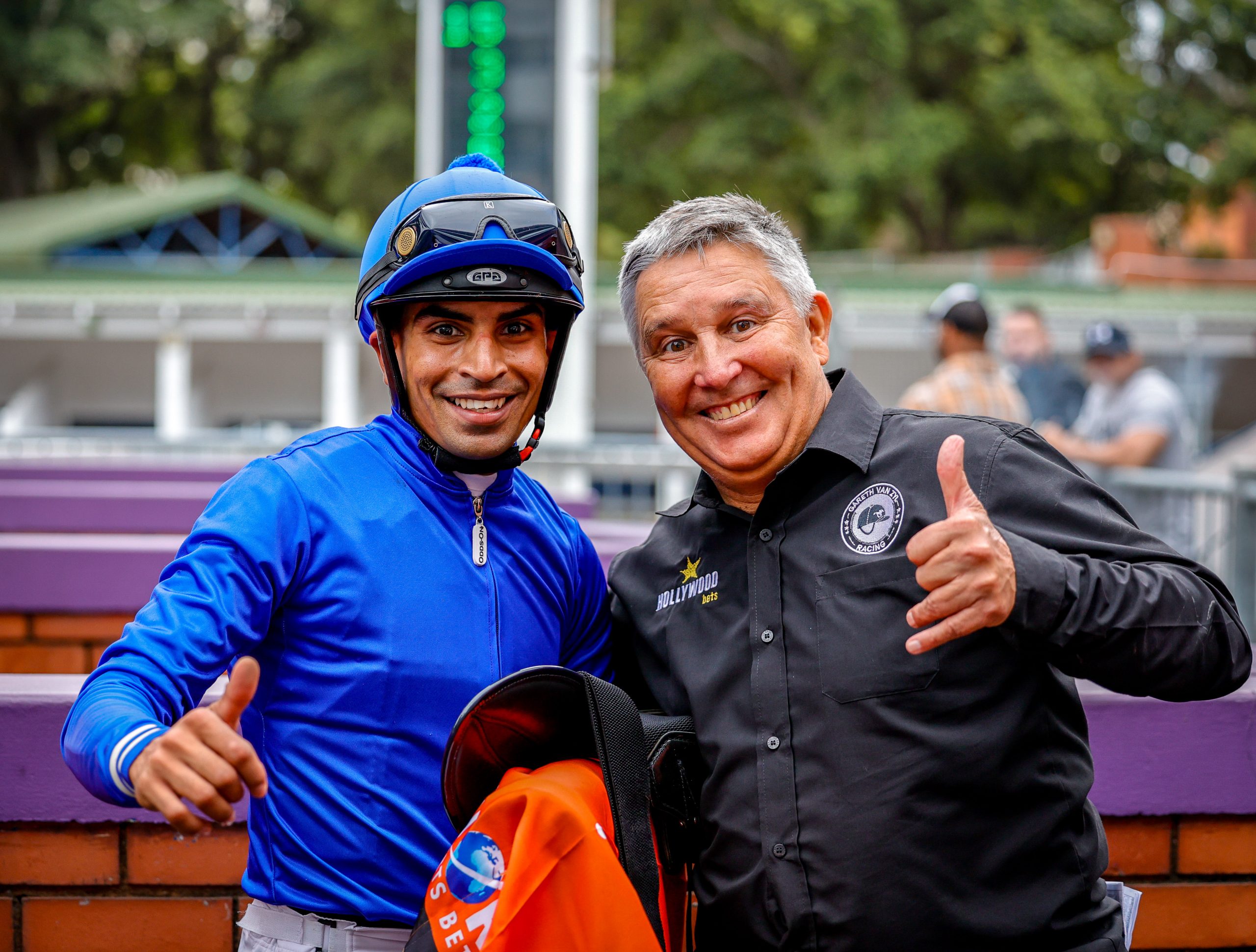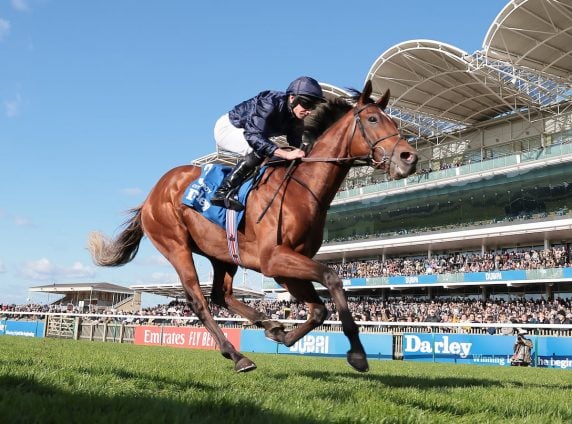The J&B Met favourite Igugu will have to endure quarantine conditions in the next few days lead up to the Western Cape’s richest horserace to be run on Saturday
Igugu was due to leave Randjesfontein for Cape Town yesterday and Mike de Kock has been happy with her preparation since her shock scratching from the TBA Paddock Stakes, but he is very unhappy about a State Veterinarian ruling that requires her to stay under vector protection at Kenilworth Quarantine Station.
De Kock said that Igugu had scoped 100% clear, had a very good blood picture and her last gallop was very good.
He added, “However, I don’t need anybody to tell me that she has enjoyed a far from perfect preparation.”
The culicoides midge that transports African Horse Sickness is a nocturnal insect and any horse staying under the vector protected conditions, as Igugu will have to, have to be locked up two hours before dusk until two hours after dawn.
De Kock was worried about two aspects of this scenario.
Firstly the trainer or anybody else is unable to check up on the horse as they can normally do and are only able to see them through a window.
Secondly de Kock pointed out that when Silver Flyer was taken out of the locked up situation on L’Ormarins Queen’s Plate day he began sweating and performing as he took in the race day environment.
A recent outbreak of AHS within a 30km radius of Randjesfontein led to the decision by the State Veterinarian that Igugu must stay in the Kenilworth Quarantine Station after arrival in the AHS Controlled Area.
What irked de Kock was that the Mike Azzie-trained Investec Cape Derby contender Potala Palace, who originates from the Randjesfontein area, was being fetched by a truck carrying two raiders from Turffontein, which is currently not an infected area, and while Potala Palace will have to stay in the Kenilworth Quarantine Station, the Turffontein horses will be allowed to stay in the holding boxes at Kenilworth.
He said, “I am aware that AHS is not a contagious disease, but it seems ridiculous that they can travel in the same truck. They should either all have to stay in quarantine or all be allowed in the holding boxes.”
De Kock was not pointing fingers at Racing South Africa, whom he said had done everything within their power to facilitate the participation of Igugu and de Kock’s other raiders.
Peter Gibson, CEO of Racing South Africa, said that nobody wanted to see any horses residing in conditions that disadvantaged them and said the outbreak had happened at an unfortunate time.
The State Vet’s ruling was made within a set of laid out principles whose sole purpose is to prevent any possibility of AHS being transported into the AHS Control Area.
When a horse is departing to the AHS Control Area from an area where there is no AHS infection within a 30km radius, three rules pertain.
- A Private Vet must check the horse to see that it is fit to travel.
- The Private Vet must then apply to the local State Vet for a movement permit and the latter will ascertain whether there is an acceptable lack of risk of importing AHS.
- The Western Cape State Vet must then be notified of the travel arrangement.
The horse is then free to travel into the AHS Control Area and will not have to stay there under vector protected conditions.
Horses travelling from an area that had been infected by AHS within 30 days of intended departure and within a 30km radius were formerly not allowed to travel into the AHS Control Area, but a special “Red Cross Permit” has now allowed horses from such areas to compete in high profile races in Cape Town.
Three rules pertain to the Red Cross Permit.
- Before departure the horses must be vector protected as best as possible.
- A real time PCR test must be taken as close to departure as possible to check for the presence of the AHS virus.
- The horses must be transported in a sealed vehicle directly to the Kenilworth Quarantine Station where they will be stabled under vector protected conditions.
The reason for rule three is that in the unlikely event that a horse is infected between the time of the PCR test and the time of departure, there will be no chance of AHS being transmitted to the midge population in the AHS Controlled Area.
The reason why horses from areas of different AHS status can travel together is that AHS is not a contagious disease and it was assumed that the pick up was done during the time of day when the midge is not active.
However, de Kock concluded, “The PCR test is a wonderful bit of science (it returns a yes or no answer for AHS within an hour or two of a sample being taken.) We are hanging our hat on this test as far as our re-admittance to the EU goes. Perhaps we should have more faith in it ourselves. Why can’t another PCR test be done in Cape Town? If it is clear there should be no reason for the horse to stay in quarantine. Are we not over complicating things?”
David Thiselton – Gold Circle
25 JANUARY 2012
The J&B Met favourite Igugu will have to endure quarantine conditions in the next few days lead up to the Western Cape’s richest horserace to be run on Saturday.
Igugu was due to leave Randjesfontein for Cape Town yesterday and Mike de Kock has been happy with her preparation since her shock scratching from the TBA Paddock Stakes, but he is very unhappy about a State Veterinarian ruling that requires her to stay under vector protection at Kenilworth Quarantine Station.
De Kock said that Igugu had scoped 100% clear, had a very good blood picture and her last gallop was very good.
He added, “However, I don’t need anybody to tell me that she has enjoyed a far from perfect preparation.”
The culicoides midge that transports African Horse Sickness is a nocturnal insect and any horse staying under the vector protected conditions, as Igugu will have to, have to be locked up two hours before dusk until two hours after dawn.
De Kock was worried about two aspects of this scenario.
Firstly the trainer or anybody else is unable to check up on the horse as they can normally do and are only able to see them through a window.
Secondly de Kock pointed out that when Silver Flyer was taken out of the locked up situation on L’Ormarins Queen’s Plate day he began sweating and performing as he took in the race day environment.
A recent outbreak of AHS within a 30km radius of Randjesfontein led to the decision by the State Veterinarian that Igugu must stay in the Kenilworth Quarantine Station after arrival in the AHS Controlled Area.
What irked de Kock was that the Mike Azzie-trained Investec Cape Derby contender Potala Palace, who originates from the Randjesfontein area, was being fetched by a truck carrying two raiders from Turffontein, which is currently not an infected area, and while Potala Palace will have to stay in the Kenilworth Quarantine Station, the Turffontein horses will be allowed to stay in the holding boxes at Kenilworth.
He said, “I am aware that AHS is not a contagious disease, but it seems ridiculous that they can travel in the same truck. They should either all have to stay in quarantine or all be allowed in the holding boxes.”
De Kock was not pointing fingers at Racing South Africa, whom he said had done everything within their power to facilitate the participation of Igugu and de Kock’s other raiders.
Peter Gibson, CEO of Racing South Africa, said that nobody wanted to see any horses residing in conditions that disadvantaged them and said the outbreak had happened at an unfortunate time.
The State Vet’s ruling was made within a set of laid out principles whose sole purpose is to prevent any possibility of AHS being transported into the AHS Control Area.
When a horse is departing to the AHS Control Area from an area where there is no AHS infection within a 30km radius, three rules pertain.
1.A Private Vet must check the horse to see that it is fit to travel.
2.The Private Vet must then apply to the local State Vet for a movement permit and the latter will ascertain whether there is an acceptable lack of risk of importing AHS.
3.The Western Cape State Vet must then be notified of the travel arrangement.
The horse is then free to travel into the AHS Control Area and will not have to stay there under vector protected conditions.
Horses travelling from an area that had been infected by AHS within 30 days of intended departure and within a 30km radius were formerly not allowed to travel into the AHS Control Area, but a special “Red Cross Permit” has now allowed horses from such areas to compete in high profile races in Cape Town.
Three rules pertain to the Red Cross Permit.
1. Before departure the horses must be vector protected as best as possible.
2. A real time PCR test must be taken as close to departure as possible to check for the presence of the AHS virus.
3. The horses must be transported in a sealed vehicle directly to the Kenilworth Quarantine Station where they will be stabled under vector protected conditions.
The reason for rule three is that in the unlikely event that a horse is infected between the time of the PCR test and the time of departure, there will be no chance of AHS being transmitted to the midge population in the AHS Controlled Area.
The reason why horses from areas of different AHS status can travel together is that AHS is not a contagious disease and it was assumed that the pick up was done during the time of day when the midge is not active.
However, de Kock concluded, “The PCR test is a wonderful bit of science (it returns a yes or no answer for AHS within an hour or two of a sample being taken.) We are hanging our hat on this test as far as our re-admittance to the EU goes. Perhaps we should have more faith in it ourselves. Why can’t another PCR test be done in Cape Town? If it is clear there should be no reason for the horse to stay in quarantine. Are we not over complicating things?”
|
Horse Photo |
Jockey |
Trainer |
Silks |
|
|
|
|
|
|
Sc#: 12 Draw: 7 Horse: IGUGU |
Anthony Delpech |
Mike de Kock |
Owner/s: Sheikh Mohammed Bin Khalifa Al Maktoum and Mr and Mrs A J Macdonald
Breeder: Kia Ora Stud, NSW |
|
Photo accreditation:
John Lewis/ Gold Circle |
Photo accreditation:
Nkosi Hlope/ Gold Circle |
Photo accreditation:
Nkosi Hlope/ Gold Circle |
|
|
Conditions of usage of photographs: All photographs supplied and hyperlinked herewith may be used free of charge, with full credit to the company, photographer and agency as provided. The photographs may not be m The J&B Met favourite Igugu will have to endure quarantine conditions in the next few days lead up to the Western Cape’s richest horserace to be run on Saturday.
Igugu was due to leave Randjesfontein for Cape Town yesterday and Mike de Kock has been happy with her preparation since her shock scratching from the TBA Paddock Stakes, but he is very unhappy about a State Veterinarian ruling that requires her to stay under vector protection at Kenilworth Quarantine Station.
De Kock said that Igugu had scoped 100% clear, had a very good blood picture and her last gallop was very good.
He added, “However, I don’t need anybody to tell me that she has enjoyed a far from perfect preparation.”
The culicoides midge that transports African Horse Sickness is a nocturnal insect and any horse staying under the vector protected conditions, as Igugu will have to, have to be locked up two hours before dusk until two hours after dawn.
De Kock was worried about two aspects of this scenario.
Firstly the trainer or anybody else is unable to check up on the horse as they can normally do and are only able to see them through a window.
Secondly de Kock pointed out that when Silver Flyer was taken out of the locked up situation on L’Ormarins Queen’s Plate day he began sweating and performing as he took in the race day environment.
A recent outbreak of AHS within a 30km radius of Randjesfontein led to the decision by the State Veterinarian that Igugu must stay in the Kenilworth Quarantine Station after arrival in the AHS Controlled Area.
What irked de Kock was that the Mike Azzie-trained Investec Cape Derby contender Potala Palace, who originates from the Randjesfontein area, was being fetched by a truck carrying two raiders from Turffontein, which is currently not an infected area, and while Potala Palace will have to stay in the Kenilworth Quarantine Station, the Turffontein horses will be allowed to stay in the holding boxes at Kenilworth.
He said, “I am aware that AHS is not a contagious disease, but it seems ridiculous that they can travel in the same truck. They should either all have to stay in quarantine or all be allowed in the holding boxes.”
De Kock was not pointing fingers at Racing South Africa, whom he said had done everything within their power to facilitate the participation of Igugu and de Kock’s other raiders.
Peter Gibson, CEO of Racing South Africa, said that nobody wanted to see any horses residing in conditions that disadvantaged them and said the outbreak had happened at an unfortunate time.
The State Vet’s ruling was made within a set of laid out principles whose sole purpose is to prevent any possibility of AHS being transported into the AHS Control Area.
When a horse is departing to the AHS Control Area from an area where there is no AHS infection within a 30km radius, three rules pertain.
1) 1. A Private Vet must check the horse to see that it is fit to travel. 2. The Private Vet must then apply to the local State Vet for a movement permit and the latter will ascertain whether there is an acceptable lack of risk of importing AHS. 3. The Western Cape State Vet must then be notified of the travel arrangement.
The horse is then free to travel into the AHS Control Area and will not have to stay there under vector protected conditions.
Horses travelling from an area that had been infected by AHS within 30 days of intended departure and within a 30km radius were formerly not allowed to travel into the AHS Control Area, but a special “Red Cross Permit” has now allowed horses from such areas to compete in high profile races in Cape Town.
Three rules pertain to the Red Cross Permit. 1. Before departure the horses must be vector protected as best as possible. 2. A real time PCR test must be taken as close to departure as possible to check for the presence of the AHS virus. 3. The horses must be transported in a sealed vehicle directly to the Kenilworth Quarantine Station where they will be stabled under vector protected conditions.
The reason for rule three is that in the unlikely event that a horse is infected between the time of the PCR test and the time of departure, there will be no chance of AHS being transmitted to the midge population in the AHS Controlled Area.
The reason why horses from areas of different AHS status can travel together is that AHS is not a contagious disease and it was assumed that the pick up was done during the time of day when the midge is not active.
However, de Kock concluded, “The PCR test is a wonderful bit of science (it returns a yes or no answer for AHS within an hour or two of a sample being taken.) We are hanging our hat on this test as far as our re-admittance to the EU goes. Perhaps we should have more faith in it ourselves. Why can’t another PCR test be done in Cape Town? If it is clear there should be no reason for the horse to stay in quarantine. Are we not over complicating things?” odified or retouched in any way, but may be cropped to suit the layout requirements of the publications. The photographs provided may be used exclusively for editorial purposes, and may be reprinted in any newspaper, magazine, television programme or on any website. These photographs may not be used for any commercial or promotional purpose, including but not limited to posters, advertisements, commercials, promotional email correspondence, point-of-sale material or any retail promotion. Should such usage be desired, please contact us at the details below. |
|||













